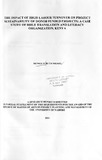| dc.description.abstract | High labour turnover has been a concern in Bible Translation and Literacy organization (BTL) in Kenya. The purpose of the research was to establish the impact of the high labour turnover on sustainability of donor funded projects within BTL. The main objective of the research was to establish the extent to which costs related to labour turnover influenced the sustainability of donor funded projects in relation to project costs, timelines and project quality. The researcher used both qualitative and quantitative approaches in carrying out the research, through a collective case study method.
The main data collection tools were questionnaires that were sent to project leaders, regional programme managers and the human resource manager, as well as personal oral interview with the resource development manager. The total number of those who responded was 16 out of 20 respondents, representing 80% response rate. The researcher established that as a result of labour turnover in Bible Translation and Literacy organization, there were increases in fmancial costs of the projects that came as a result of increased separation costs, increased recruitment costs as well as increases in salaries for new staff and increases of commodity prices that came as a result of extended time lines.
There was extension of activity time lines that came as a result of time lost during the period that the organization was looking for a replacement as well as when the new staff were being trained. Human resource time taken only for doing exit interviews and paperwork for one departing employee, as well as reviewing job applications and interviewing new candidates translated to 32% of her working hours in a month. The effect was repeated for others, as project leaders had to train new employees as well as those who had to do extra work left by other employees. There was compromised quality of work that came as a result of lost expertise and others doing work that they were not well trained to do, as well as having more workload hence not giving attention to quality of work but concentrating on finishing the tasks. The researcher established that there was a negative relationship between labour turnover and sustainability of donor funded projects. | en_US |

